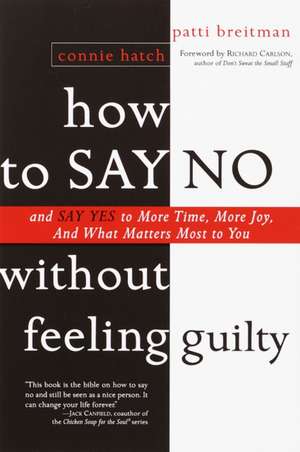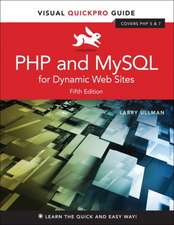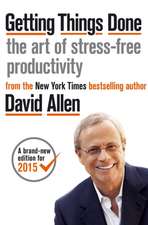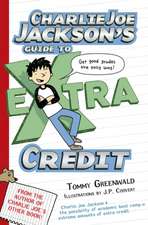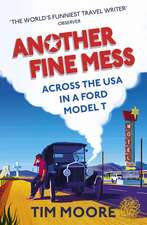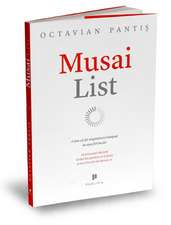How to Say No Without Feeling Guilty: And Say Yes to More Time, and What Matters Most to You
Autor Patti Breitman, CONNIE HATCH Richard Carlsonen Limba Engleză Paperback – 31 ian 2001
—from the Foreword by Richard Carlson, author of Don't Sweat the Small Stuff
Find more time and energy for the things you love to do—learn to say no without feeling guilty!
The simple word "no" is often the most difficult to say. Yet anyone can develop the skills to say no with confidence, kindness, and peace of mind. And the benefits are enormous. You'll spend less time doing things you don't want to do with people you don't want to see, and move closer to your own priorities and passions.
How to Say No Without Feeling Guilty shows you:
The five simple techniques that will help you say no with finesse in nearly any situation
How to apply two basic principles to minimize guilt about saying no and reduce the likelihood of personal conflicts
In addition, authors Patti Breitman and Connie Hatch provide specific language and practical strategies for defending your boundaries against life's many intrusions and distractions, including:
Demanding friends and family members
Unwelcome invitations, dates, and romantic entanglements
Requests for money, whether from friends, relatives, organizations, or panhandlers
Unreasonable assignments at work
Pushy people who ask for too many favors
Junk mail, annoying phone calls, and buddies with something to sell
High-maintenance people
And much more
Ultimately, "no" can be one of the most positive words in your vocabulary. Whether you crave more family time, more time for yourself, or more time to pursue a dream, saying no frees up room for the "yeses" in your life.
Preț: 101.80 lei
Nou
Puncte Express: 153
Preț estimativ în valută:
19.48€ • 20.39$ • 16.12£
19.48€ • 20.39$ • 16.12£
Carte disponibilă
Livrare economică 17-31 martie
Preluare comenzi: 021 569.72.76
Specificații
ISBN-13: 9780767903806
ISBN-10: 0767903803
Pagini: 272
Dimensiuni: 133 x 205 x 19 mm
Greutate: 0.24 kg
Editura: HARMONY
ISBN-10: 0767903803
Pagini: 272
Dimensiuni: 133 x 205 x 19 mm
Greutate: 0.24 kg
Editura: HARMONY
Notă biografică
PATTI BREITMAN is a literary agent and expert public speaker who has appeared on numerous radio and television shows. She also teaches classes throughout the San Francisco Bay Area, where she lives.
CONNIE HATCH is a professional writer and president of Words to Market, a creative services company. She lives in New York City.
CONNIE HATCH is a professional writer and president of Words to Market, a creative services company. She lives in New York City.
Extras
Saying No: The Basics
I really don't want to spend Saturday night baby-sitting my neighbor's three kids. But when she asked me, I didn't know what to say. So I just said yes. I wish I'd had time to think of an excuse.
Damn! I should have known Mike would hit me up for a loan. Why did I ever tell him about getting that bonus check?
In my family, there's some kind of event going on nearly every weekend. Sometimes I just want to stay home and do nothing. But that doesn't seem like a good enough reason. Unless I have something else on the calendar, I feel obligated to say yes.
In this chapter we'll show you a few basic techniques that can help you say no more easily and avoid regrets like these.
To build up your courage for those really difficult "no's," start small. Practice saying no in nonthreatening encounters where there isn't much at stake. Tell your best friend you don't want to go to her choice of restaurant, and suggest another. Tell your husband you don't want to go to the hardware store with him. Tell your son he can't have more dessert. The object is to hear yourself saying no successfully. Little by little, stretch yourself by saying no in more challenging circumstances.
As you begin to develop the healthy habit of saying no, you'll find the process gets easier all the time. Most likely, you will settle on a few different phrases that work for you and that can be applied to the situations you face most often. The more you use them, the more comfortable you'll become with them. Over time, you will utter them with confidence and ease.
Basic Principles
There are a couple of basic principles woven through this book that we'd like to emphasize here.
First, saying no without guilt is much easier for all concerned when it's done in the context of generosity. This means being helpful and available to family, friends, co-workers, and neighbors whenever you possibly can—in other words, when it won't cause significant stress or inconvenience and when you can say yes without resentment. Just as important, give yourself a little credit for being a generous person. Recognizing the many things you do for others with a willing spirit, you'll feel more confident and less guilty at times when you really do want to say no to them.
The second basic principle of saying no: Less is more. The most powerful and effective "no's" are the least complicated, but most of us have a great deal of difficulty saying no politely and leaving it at that. Whether we're telling the boss we can't work late or telling a neighbor we can't walk his dog, we feel obliged to justify our "no" with a detailed explanation—often a fictitious one. Yet elaborating is seldom necessary, and it leaves you on shaky ground. The more specific information you supply, the more likely the other person will be to: a) try to figure out a way to "solve the problem" so that you can actually do the thing he wants you to do (which, of course, you don't want to do), b) decide that your reason for saying no isn't good enough and be miffed about it, or c) catch you in a lie (if you're lying).
On the other hand, when you make a statement like "I'm sorry, I won't be able to" or "I'm afraid I'm busy that day," you sound clear and decisive. If the other person insists on knowing why, the burden of prying will be on him. When that happens, don't fall into the trap of trying to come up with new, more creative excuses to satisfy someone who can't take no for an answer. Instead, repeat yourself as often as necessary. You can emphasize different words, change the language around a bit, or offer some other vague comment. "I'm busy that day" can also be expressed as "I've got plans," "I have a previous engagement," "I've got an appointment I can't break," or "I've had something on my calendar for weeks." Hold your ground in the face of a rude, nosy, or aggressive person. No one has the right to force you to violate your own privacy.
This doesn't mean it's a mistake to tell people the reason you're saying no. Especially when the relationship is a close one, it doesn't feel natural to be too cryptic. But remember that by keeping explanations to a minimum and repeating yourself as often as necessary, you'll be in a stronger position.
Basic Techniques
Now let's look at the basic techniques every good naysayer should have in her repertoire. Throughout the following chapters, you'll find numerous ideas for using these basics to say no like a pro:
1. Buying Time
If you do nothing else suggested in this book, acquire the habit of buying time before responding to requests. It takes the pressure off when you can't figure out how to say no diplomatically or simply need more time to decide. A few stock "time-buying" responses will cover you in just about every situation. For example:
* I need to check my calendar; I'll get back to you.
* Let me check with my husband/wife/partner to see if we're free that day.
* I've got to think about that; I'll let you know.
* I've got to take a look at my cash flow.
* I need to find out if I have to work first.
2. "The Policy"
We love to say no with the phrase "I have a policy." For example, suppose a friend asks for a loan you don't want to extend. Utter the phrase Sorry, I have a policy about not lending money, and your refusal immediately sounds less personal.
In all kinds of situations, invoking a policy adds weight and seriousness when you need to say no. It implies that you've given the matter considerable thought on a previous occasion and learned from experience that what the person is requesting is unwise. It can also convey that you've got a prior commitment you can't break. When you turn down an invitation by saying, "Sorry, I can't come—it's our policy to have dinner together as a family every Friday night," it lets the other person know that your family ritual is carved in stone.
Of course, when searching for your response, it helps to have a policy. Which brings us to an important point: Saying no comfortably and without guilt requires you to really think about what you stand for. Why are you saying no? As you learn to eliminate unwanted obligations from your life, what are you making room for? When you can identify and embrace your priorities and focus on what you want more of—for example, time with the family, money for an important project or cause—you feel more justified saying no in order to pursue those goals.
I really don't want to spend Saturday night baby-sitting my neighbor's three kids. But when she asked me, I didn't know what to say. So I just said yes. I wish I'd had time to think of an excuse.
Damn! I should have known Mike would hit me up for a loan. Why did I ever tell him about getting that bonus check?
In my family, there's some kind of event going on nearly every weekend. Sometimes I just want to stay home and do nothing. But that doesn't seem like a good enough reason. Unless I have something else on the calendar, I feel obligated to say yes.
In this chapter we'll show you a few basic techniques that can help you say no more easily and avoid regrets like these.
To build up your courage for those really difficult "no's," start small. Practice saying no in nonthreatening encounters where there isn't much at stake. Tell your best friend you don't want to go to her choice of restaurant, and suggest another. Tell your husband you don't want to go to the hardware store with him. Tell your son he can't have more dessert. The object is to hear yourself saying no successfully. Little by little, stretch yourself by saying no in more challenging circumstances.
As you begin to develop the healthy habit of saying no, you'll find the process gets easier all the time. Most likely, you will settle on a few different phrases that work for you and that can be applied to the situations you face most often. The more you use them, the more comfortable you'll become with them. Over time, you will utter them with confidence and ease.
Basic Principles
There are a couple of basic principles woven through this book that we'd like to emphasize here.
First, saying no without guilt is much easier for all concerned when it's done in the context of generosity. This means being helpful and available to family, friends, co-workers, and neighbors whenever you possibly can—in other words, when it won't cause significant stress or inconvenience and when you can say yes without resentment. Just as important, give yourself a little credit for being a generous person. Recognizing the many things you do for others with a willing spirit, you'll feel more confident and less guilty at times when you really do want to say no to them.
The second basic principle of saying no: Less is more. The most powerful and effective "no's" are the least complicated, but most of us have a great deal of difficulty saying no politely and leaving it at that. Whether we're telling the boss we can't work late or telling a neighbor we can't walk his dog, we feel obliged to justify our "no" with a detailed explanation—often a fictitious one. Yet elaborating is seldom necessary, and it leaves you on shaky ground. The more specific information you supply, the more likely the other person will be to: a) try to figure out a way to "solve the problem" so that you can actually do the thing he wants you to do (which, of course, you don't want to do), b) decide that your reason for saying no isn't good enough and be miffed about it, or c) catch you in a lie (if you're lying).
On the other hand, when you make a statement like "I'm sorry, I won't be able to" or "I'm afraid I'm busy that day," you sound clear and decisive. If the other person insists on knowing why, the burden of prying will be on him. When that happens, don't fall into the trap of trying to come up with new, more creative excuses to satisfy someone who can't take no for an answer. Instead, repeat yourself as often as necessary. You can emphasize different words, change the language around a bit, or offer some other vague comment. "I'm busy that day" can also be expressed as "I've got plans," "I have a previous engagement," "I've got an appointment I can't break," or "I've had something on my calendar for weeks." Hold your ground in the face of a rude, nosy, or aggressive person. No one has the right to force you to violate your own privacy.
This doesn't mean it's a mistake to tell people the reason you're saying no. Especially when the relationship is a close one, it doesn't feel natural to be too cryptic. But remember that by keeping explanations to a minimum and repeating yourself as often as necessary, you'll be in a stronger position.
Basic Techniques
Now let's look at the basic techniques every good naysayer should have in her repertoire. Throughout the following chapters, you'll find numerous ideas for using these basics to say no like a pro:
1. Buying Time
If you do nothing else suggested in this book, acquire the habit of buying time before responding to requests. It takes the pressure off when you can't figure out how to say no diplomatically or simply need more time to decide. A few stock "time-buying" responses will cover you in just about every situation. For example:
* I need to check my calendar; I'll get back to you.
* Let me check with my husband/wife/partner to see if we're free that day.
* I've got to think about that; I'll let you know.
* I've got to take a look at my cash flow.
* I need to find out if I have to work first.
2. "The Policy"
We love to say no with the phrase "I have a policy." For example, suppose a friend asks for a loan you don't want to extend. Utter the phrase Sorry, I have a policy about not lending money, and your refusal immediately sounds less personal.
In all kinds of situations, invoking a policy adds weight and seriousness when you need to say no. It implies that you've given the matter considerable thought on a previous occasion and learned from experience that what the person is requesting is unwise. It can also convey that you've got a prior commitment you can't break. When you turn down an invitation by saying, "Sorry, I can't come—it's our policy to have dinner together as a family every Friday night," it lets the other person know that your family ritual is carved in stone.
Of course, when searching for your response, it helps to have a policy. Which brings us to an important point: Saying no comfortably and without guilt requires you to really think about what you stand for. Why are you saying no? As you learn to eliminate unwanted obligations from your life, what are you making room for? When you can identify and embrace your priorities and focus on what you want more of—for example, time with the family, money for an important project or cause—you feel more justified saying no in order to pursue those goals.
Recenzii
Advance praise for How to Say No Without Feeling Guilty:
"This book is the bible on how to say no and still be seen as a nice person. It can change your life forever."
--Jack Canfield, coauthor of the Chicken Soup for the Soul® series
"It's a book to consult over and over again. I recommend it."
--John Gray, Ph.D., author of Men Are from Mars, Women Are from Venus
"Brilliant! This practical, powerful book will help you express what you really feel and want."
--Harold H. Bloomfield, M.D., author of Making Peace with Your Past
"This is a charming, intelligent, and practical guide to finding the great YES of life, by learning that NO is a complete sentence. Thoroughly enjoyable."
--Anne Lamott, author of Traveling Mercies
"A road map for opening up lots of needed space in our lives. Out with the guilt, and in with a life that is ours again!"
--Janet Luhrs, author of The Simple Living Guide and Simple Loving
"How to Say No Without Feeling Guilty enables us to rid ourselves of needless guilt so we can live a richer, more fulfilling life."
--Dave Pelzer, author of A Child Called "It", The Lost Boy, and A Man Named Dave
"This book is wonderfully useful, doable, wise, and inspiring."
--Sue Bender, author of Plain and Simple and Everyday Sacred
"A must for anyone who wants to live a life of joy and ease, and feel good about it."
--Marcia Wieder, author of Making Your Dreams Come True
"The best book I ever read on setting boundaries. This is a must-read for everyone!"
--Sirah Vettese, Ph.D., author of What Happened to the Prince I Married?
From the Hardcover edition.
"This book is the bible on how to say no and still be seen as a nice person. It can change your life forever."
--Jack Canfield, coauthor of the Chicken Soup for the Soul® series
"It's a book to consult over and over again. I recommend it."
--John Gray, Ph.D., author of Men Are from Mars, Women Are from Venus
"Brilliant! This practical, powerful book will help you express what you really feel and want."
--Harold H. Bloomfield, M.D., author of Making Peace with Your Past
"This is a charming, intelligent, and practical guide to finding the great YES of life, by learning that NO is a complete sentence. Thoroughly enjoyable."
--Anne Lamott, author of Traveling Mercies
"A road map for opening up lots of needed space in our lives. Out with the guilt, and in with a life that is ours again!"
--Janet Luhrs, author of The Simple Living Guide and Simple Loving
"How to Say No Without Feeling Guilty enables us to rid ourselves of needless guilt so we can live a richer, more fulfilling life."
--Dave Pelzer, author of A Child Called "It", The Lost Boy, and A Man Named Dave
"This book is wonderfully useful, doable, wise, and inspiring."
--Sue Bender, author of Plain and Simple and Everyday Sacred
"A must for anyone who wants to live a life of joy and ease, and feel good about it."
--Marcia Wieder, author of Making Your Dreams Come True
"The best book I ever read on setting boundaries. This is a must-read for everyone!"
--Sirah Vettese, Ph.D., author of What Happened to the Prince I Married?
From the Hardcover edition.
Descriere
Now in paperback comes the modern, life-changing guide to managing today's unrealistic demands on one's time, finances, and energy by teaching a new way to say "no".
